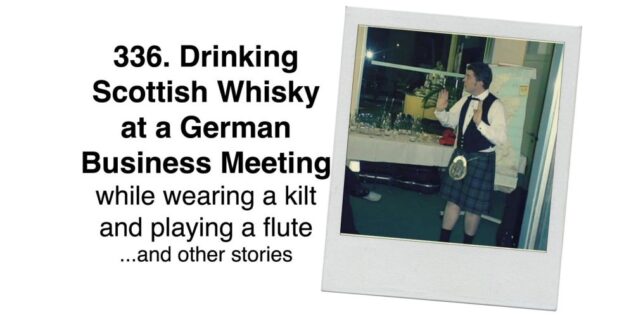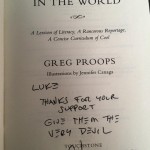In this episode the results & winners of the LEP photo competition are announced, and – it’s the 7th birthday of Luke’s English Podcast! This episode is long but you don’t have to listen to it in one go. You can listen, pause, do something else, listen later and so on. Enjoy!
![]() [DOWNLOAD]
[DOWNLOAD]
Ladies and gentlemen, your attention please because the results of the LEP photo competition are here. Try to contain your excitement. I know we’ve all been waiting for weeks with bated breath to know who has won this most prestigious of prizes, but you can now relax and breathe normally because the wait is over! Yes, in this episode I’m going to give you the results of the photo competition. I’ll tell you the winners and the runners up, I’ll describe the winning photos in some detail including my thoughts and feelings about them, and later in the episdoe I’m going to ramble on about some other stuff.
Also, this is the 7th birthday of my podcast!
Also, I’ve just realised that this is the 7th birthday of LEP! It’s been almost exactly 7 years since I uploaded the very first episode of Luke’s English Podcast. So, this is not just the photo competition episode but also the 7th birthday of Luke’s English Podcast too! Wow. Has it been 7 years? 7 years of my life have gone into this project. I have put a huge amount of time and energy into this over the years and I’ve loved every moment of it. Time flies doesn’t it. Yes it does. I’ll talk more of birthday-related things later, but if you’re feeling like you want to congratulate the podcast, celebrate the birthday, send me a card or a gift, or say thank you for my work or something like that, and you’re wondering what the appropriate thing to do is – well, here are some suggestions:
You could…
- leave a lovely comment on the website explaining briefly what LEP means to you. It’s always nice to read your feedback and it helps the podcast because new visitors will see that I have an active, engaged, positive audience and that the podcast is good. It’ll help me reach a wider audience.
- give the podcast a review on iTunes. This is really important actually – lots and lots of new people come to my podcast through iTunes and many of them will look at the reviews. So, if you enjoy this podcast and you feel it’s made a difference to your English, leave me a good review on iTunes. Lots of other people will see your review and it will really make a difference to the reputation of the podcast. Just go to https://itunes.apple.com/fr/podcast/lukes-english-podcast-learn/id312059190?l=en&mt=2 , view the podcast in iTunes and leave your review.
- the most sincere way to say thanks is to leave me a donation via paypal. You should be able to find a button on every page of the website that says DONATE. This is the most sincere way you can thank me, because it’s like an investment in the podcast. Any contribution you make will support the podcast directly because it’ll help me to cover costs, such as website hosting and other payments, and because it just means I can do things like buy my wife lunch or something, and that’s important for my quality of life and my energy, which then feeds back into the podcast.
Prizes
There will be more birthday celebrations later but first let’s get back to the photo competition, and here is just a quick reminder of what’s up for grabs in terms of prizes (this is where things get very dramatic and exciting – the tension is almost palpable isn’t it?!) First place will get two prizes: an LEP mug and another gift of the winner’s choice (so, another mug, a t-shirt, a pad or a tote bag), the two runners-up will receive one prize: an LEP mug each, and then there’s a surprise 4th prize, in a category that I’ve just added, for the winner of the Luke’s Choice Award (a gift of the winner’s choice from the gift shop).
I know some of you might be listening to this thinking – “What competition?” “What’s he talking about?” If that’s the case it probably means you haven’t listened to episodes 313-327 and so you’re blissfully unaware of this photo competition. Either that or you just forgot about it, or you had your memory wiped by Will Smith and Tommy Lee Jones or something. So, if you don’t remember, go back to episode 313 and 327 to remind yourselves of this competition and to find out more details.
Hey, don’t skip this episode, alright?
Some of you might also be thinking, “Oh, very good Luke, very good, but I might skip this episode because I’m not involved in the competition because I didn’t send a photo and I didn’t vote and yada yada yada”. First of all I should say that I would be deeply shocked and saddened if you skipped an episode. I mean really. It would upset me very much and it would be a huge trauma for me. I might have to go and have a lie down or a cup of tea, just to get over the emotional impact of knowing that you’d decided not to listen. In fact, I’m feeling very emotional about it right now just thinking about that… But if it makes a difference to you I’d like to say – I do hope you stay and listen, because I think there are some good things to be gained from listening to this, and I’ve got some biscuits here. Don’t you want a biscuit? Anyway, this episode is not just about announcing the winners, but it’s also about describing some of the popular photos using words, in English, and sharing thoughts and feelings with the LEP community.
Yes, I will be describing and commenting on the photos during the episode – so you’ll hear some descriptive language. I suggest you check the page for this episode to see the pics I’m talking about. Also, in episode 327 I taught you some very useful little phrases and techniques for describing pictures, which should be very important if you’re taking a Cambridge exam, or if you’d like to learn some useful little phrases and techniques for describing pictures. So, that’s back in episode 327.
Summarising the Competition
Just in case you don’t know, or you’ve forgotten or something, let me quickly sum up the competition again.
Some time late last year I opened up this new contest. I got the idea originally from a Long Term Lepster (LTL) called Guillaume who suggested it to me ages ago by email. He said, “Hey why don’t you do a competition in which you ask your listeners to send you photos of them listening in different situations, and you could share the photos on your website and people could vote for their favourites, and the winner could get a prize like an LEP mug or t-shirt or something?” and I thought, hmm, a competition in which my listeners send me photos of them listening in different locations and I could share the photos on my website and people could vote for their favourites, and the winner could get a prize like an LEP mug or t-shirt or something, that’s not a bad idea! And so I decided to do just that, and in episode 313 ( I think) I said, “I’m launching a competition in which you my listeners can send me photos of you listening in different locations and I’ll share the photos on my website and people can vote for their favourites and the winner could win a prize like an LEP mug or a t-shirt or something. All you have to do is take photos of yourself listening in different situations and I can share them on my website and everyone can vote for their favourite ones, and the winner could win a prize like an LEP mug or a t-shirt or something. What do you think?”
And people said “What? Sorry, can you repeat the sentence?”
Most people seemed up for the competition, which was nice.
There was just one condition , I said – “you have to include something that proves that you’re listening. So, that could be some headphones in the pic, or an LEP logo, or something like that.”
And that’s exactly what happened, everyone sent me pictures of themselves listening in different situations and I shared them on the page for episode 327 and then everyone voted for their favourite ones. I say, everyone – I actually don’t mean everyone – not everyone in the world. I didn’t get 7.125 billion votes, and not even everyone who listens to this podcast voted. In fact, just a small fraction of my listeners voted – which means that there’s a good chance that you, listening to this right now, yes you, the one with the ears – there’s a good chance that you didn’t take part in this at all. And I’d like to ask you why not?? What were you doing? Did you have something better to do? I can’t imagine what could be more important than voting in this competition! Except maybe writing a report for work or something – in fact there might be lots of things that stopped you from voting maybe you were going food shopping to buy food to keep you and your family alive, maybe you were cooking dinner and you couldn’t vote, eating dinner, feeding dinner to your family or friends, cleaning up the kitchen after dinner, digesting food (I can’t vote I’m busy digesting), washing clothes, wearing clothes (sorry, I couldn’t vote, I was too busy wearing clothes), taking your clothes off in the evening – that’s time consuming, sleeping, being woken up by your alarm, putting your alarm on snooze, going back to sleep again, being woken up by your alarm again, putting it on snooze again, going back to sleep again, being woken up by the alarm AGAIN, and putting it on snooze AGAIN, then suddenly realising that you’re really late, smashing the alarm with a hammer, jumping out of bed, putting your clothes back on, having a shower, changing your clothes because they’re all wet, going to the toilet, taking another shower, cancelling 3rd world poverty, making coffee, leaking sensitive legal documents to the media that reveal the hoarding of massive amounts of secret money by a law firm based in Panama as part of a huge multinational tax avoidance scheme involving the leaders of many developed countries and various semi-legal tax avoidance schemes in offshore accounts based in tax-havens all over the world revealing incredible levels of alleged corruption at the highest level, eating a banana, going to work. You know, just the usual daily chores that take up our time. Maybe you were doing one of those things, and you couldn’t vote in the competition. I understand! That’s fine! I think that most people for one reason or another decided not to take part in the competition, and probably said to themselves – “Who? Me? Send pictures of myself listening in different situations so that Luke can share them on his website and then people can vote for their favourite pictures and the winner could win a prize like an LEP mug or a t-shirt or something? That sounds nice, but sorry Luke I’ve got a lot on my plate at the moment – I’ve got a big meeting with the boss this morning, and I’m trying to learn phrasal verbs, I’ve got to shred a few documents at the Panamanian law firm where I work and I have a conference call between with David Cameron, Vladimir Putin and some other world leaders that I have to attend to, and I have to eat these biscuits and I’ve got to escape from this pink gorilla that’s chasing me and I’m trying to learn the phonemic script to improve my English pronunciation… so I can’t do it I’m afraid, I can’t vote – but carry on anyway, it sounds like a lovely plan.”
Right. Are you following this?
I’m just saying that most people didn’t get involved in the voting, but that’s totally fine of course, and in a way it’s perfect because if 7.125 billion people had voted and sent me photos, I would have been impossibly busy over the last few weeks and my website would have crashed and so on… So, all’s well that ends well.
Total number of votes and photos? In fact I received a grand total of about 115 photos and then a total of about 270 votes.
Why did I do the comp?
I wanted to see things from your point of view a bit. Obviously, I do these podcasts on my own, mostly. Sometimes I’m joined by other people, which is lovely. But usually I just sit here on own (sad, lonely music?), I record episodes, publish them, read comments from some of you, and watch the download numbers go up and up and I think – who are all these people? Where are they? What are they doing? What are they thinking? It turns out, you’re all just normal human beings (which shouldn’t be a surprise) – I mean, you’re all normal people (I say normal, of course you’re all extraordinary) but seriously, you’re ordinary people just going about your lives in different countries, in different weather conditions, in different environments and you find time to listen to this podcast while you’re doing it. There’s a pretty diverse range of people out there in different situations, but the cool thing is that you’re all united by the fact that you listen to this podcast. You’re united by other things too of course, like the fact that you’ve all got legs (although, saying that I realise that some of you might not have legs of course and that’s great) or you’re united by the fact that you live on earth and other things, like that you need to drink water regularly, breathe air, eat food, go to the loo sometimes, we’re all united by these things, you probably like eating good food – who doesn’t? and you probably don’t like it when you have a stone in your shoe, it’s annoying when your neighbours play loud music all night, sometimes you run out of sugar or milk or, err, rice, and you get angry, like “Why don’t we have any sugar left!? Oh god!!!” or you find it embarrassing when you drop something in public or you trip over in the street and you’d love to get more sleep in the mornings. Yes, you’re all united by those things, but you’re also united by the fact that you all listen to this podcast.
In all seriousness, I can’t really overstate how amazing that is. It’s amazing. It is amazing. It’s amAAAAYzing. OK? Thanks for listening and thanks for your photos & votes.
But really, I was quite surprised at what a fun and even touching experience it was to look at all the photos that were sent. Did you check out the page for 327? It was a genuinely lovely experience, that was just a little bit heartwarming. Unless you’re a steel-hearted terminator of a person, who doesn’t let emotion defrost the edges of your frozen heart, I imagine that you felt it to be quite sweet as well, to look at all these pics of people around the world.
Not all the photos were outstanding works of photographic genius of course. In fact many of them were probably taken right at the moment that you were listening to episode 313 when I said “just take a pic while you’re listening – just take a pic of whatever you can see right now” and that’s exactly what a lot of you did – so there are some photos of computer screens, or mobile phones, or views from car or bus windows and stuff, but these pictures do have interesting details in the background or on the edges of the frame – just revealing little things that show us the things we have in common but also differences like which part of the world you’re in, or what your life is like – for example, the weather, the landscape, your working environment, other people we can see in the pictures, public spaces, etc.
Luke gets deep and meaningful
I’d like to take this opportunity to get deep and meaningful now and say some profound things about what your contribution to this photo competition means to me personally, and the way it represents something special as we move through life in this crazy world we call ‘earth’, struggling to make sense of what’s going on around us and searching for some oasis of calm and some sincere sentiments outside the usual banal nonsense we are exposed to in the media and in advertising. So, here’s some profundity for you.
So here we are, all living on this planet. We all lead these separate lives in different places with our own unique problems, stresses, responsibilities etc, but at the end of the day when we put our heads down to go to sleep, or when we lose a sock in the washing machine, or when we put our headphones on to listen to LEP, aren’t we all the same in some ways? We essentially care about the same things, don’t we? Despite being in different countries, divided by political boundaries, geo-cultural distinctions, ethnic and religious differences, we are all connected. We live pretty similar lives and we share the world together (cheesy). Things we do, even small things, affect the world around us, and affect other people’s lives – even people we can’t see might be inadvertently affected by our actions in some way, and what’s good for other people is good for the world ultimately is good for us too. You know, it’s like what Cypress Hill said – “What goes around comes around”. (Cypress Hill – “What go around come around!” – I couldn’t have said it better myself, except that it’s “what goES around comeS around”, but other than that, well done Cypress Hill.)
OK this might sound bit cheesy and naive but I think it’s true, and what I’m trying to say is that it’s stupid to divide ourselves up into little groups and isolate from each other, alienate people, stigmatise or scapegoat people and point the finger at others for being different. We should celebrate our differences, like our different customs and behaviour but we shouldn’t let those differences drag us into fighting each other on behalf of people who just care about their own power. Yeah man. Deep. OK, that was a cheesy and slightly preachy message there, but there it is. I think there’s a place for a little bit of cheese and maybe the odd bit of preachiness on this podcast sometimes because I enjoy the fact that my podcast is something that crosses borders and I think these things need to be said. It’s nice. If you don’t agree that we’re all interconnected in complex ways and that humans all basically deserve to be treated with respect, and that we have more things in common than differences – if you don’t agree with me, then leave your comments on the webpage unless you’re too busy shredding documents in an office somewhere.
So, back to the photos
Seeing people’s working lives – it’s awesome to observe the different types of work that my listeners do, and there are some interesting things in there, like Julia from Russia who works with gold for example.
Multitasking – it’s great to see so many people managing not just to listen to the podcast but also to do other things at the same time – like playing the piano, cooking, driving or in some cases answering the call of nature – (that means going to the toilet – yes I got a couple of pics of people listening in the loo). Good work (not for the toilet thing – I’m not judging you based on your performance in the toilet) but good work for the multitasking if that’s how you listen to this podcast!
Babies listening – There are a couple of little babies (newborn ones) listening too, which I do think is a good way to get the kids started on English. I wonder what this new generation will be like in English – the generation who will grow up with access to English online. It’s possible to raise kids with good English if you just let them interact with it from an early age. It’ll definitely help. Obviously, you should speak to them and get them to speak to you in English too. Hunter in Taiwan – I’m happy to see he’s smiling while listening to the podcast!
I know that some of my episodes are really long. I’ve spoken about how I think that’s good for your English. But I realise that your time is precious and I think it’s just brilliant that you choose to spend that time listening to this.
So, as ever – thank you for devoting your time to this podcast. I’m glad my work is appreciated.
Obviously it’s a free podcast and I do this in my free-time so really it’s you who should be thanking me – writing me heartfelt messages filled with praise and admiration, sending me generous donations and and religiously recommending my podcast to every single person you meet (literally everyone) but nevertheless, thank you for devoting your time to LEP. In fact, joking aside, many of those things are true – I really do get regular messages from my listeners telling me how appreciative they are. In fact, you may have sent me an email or written a comment or something saying thank you and I appreciate that. Your feedback is great.
Also, congratulations to you for having the sense to listen to a podcast to improve your English, because in my professional opinion it’s a very good thing for you to do and it should give you an edge over other people who don’t do it. Obviously you should also do other practice as well, to activate your English including doing plenty of speaking if you can find ways to do that. But, you know, congrats for adding an English language podcast to your lifestyle. It’s BOUND to have an impact on your English.
So, now that I’ve rambled on about the podcast for a while let me now ANNOUNCE THE WINNERS of the competition and DESCRIBE THE PHOTOS in more detail. (why did I put those words in CAPITALS? …I don’t know – it just seemed more EMPHATIC!)
PHOTO COMP – RESULTS
4 prizes: 2 runners up, the winner, and the Luke’s Choice Award.
RUNNERS-UP (a mug each)
RUNNER UP (3rd place) Walter near Milan in Italy – highest listener? 20 votes.
Thoughts: This is simply an amazing view and it looks like the perfect place to listen to the podcast. Walking in the mountains must be invigorating and energising, and I hope you also get some mental stimulation from the podcast while you’re doing it. I also like the composition of the photo.
RUNNER UP (2nd place)
Photo title: Sergio’s illustration of me as a Jedi in training / Sergio Tellez LEP JEDI and artist! Total = 22 votes

Sergio Tellez LEP JEDI and artist! He decided to draw a picture of me as a Jedi in training! :D I’m Luke Skywalker, finally.
Here’s a closer look at that illustration:
Note: Just describe the photo. What’s yoda whispering in my ear? “Mmmm, strong in the ways of podcasting you have become, but incomplete your training is.” Why master Yoda? What must I do to become a true Jedi Master of English Teaching? “Hmmm, monetise your podcast you must! Yes! Create online courses! Download them people will! Help them learn, you can! Video courses you could produce, yes! Study packs, pdf worksheets. Publish and sell your own materials online you must. Only then, a Jedi you will be.” OK master Yoda. I’ll try. “Hmm speak not of “TRY”. DO or DO NOT. There is no ‘TRY'”. Your voice is a bit weird master Yoda, are you ok?
Thoughts: A lot of effort went into this. The illustration is great, particularly Yoda. You’ve also done a pretty good job of capturing my face, probably based on just one photo. Also, the picture shows a lot of things like the fact that you’re listening while drawing, you’re a Star Wars fan, and you’re aware that I am too. It shows that you’ve been paying attention! I am Luke Skywalker after all. It’s really funny and nice!
OVERALL WINNER (1st place) (a mug + t-shirt, bag or pad)
Gabriella in Italy – listening while doing the housework (29 votes)
Thoughts: This is a great pic because it shows very clearly the way that many people listen to the podcast – while doing something else. Gabriella is obviously very clever to combine the two, and she seems so happy! Big smile on her face, and it’s just a very striking and colourful picture. There’s something appealing about it. It’s a slice of life. We have a glimpse into your home, and we get a sense of how much you enjoy listening to the podcast. Lovely stuff!
Luke’s Choices for Honourable Mentions (from ones that didn’t win) – and one of these will receive a Luke’s Choice Award (a mug)
These are photos that didn’t win or get runners up prizes, but which I’d like to mention because I like them.
Esther and so many ginger biscuits 9
Dima Okun – listening all the time! 8
Lеksandra Sokolova – an artist who listens while illustrating – sashasokolova.com 8
Denis (Bosnia and Herzegovina) during his Orchestra Rehearsal 9
Thavorn Twinant from Thaliand in San Francisco 10
Hunter in Taiwan listening with 14 day old son 12
Zdenek_Lukas in Czech Republic 13
Sylke Strüber and her pet dog Robin in Germany 13
Meliana and bear in Wroclaw (in Poland), which is this year European Capital of Culture 15
Mateusz from Poland – and his LEP fish 3
Paquan Satamparat in Thaliand with another LEP Ninja – turtley amazing 1
Anna – on the way from China to Vietnam 5
Guido in Milan – giving LEP some free publicity 7
Mayumi padawan learner from Japan just having seen Star Wars 6
Alexander in hospital in Russia – don’t worry he’s ok – and he’s listened to every single episode of LEP while recovering.
Lê Phương Thảo sunrise after staying up all night studying 1 (stayed up all night studying and then chose to listen to my podcast – instead of crashing out in bed, exhausted – you’ll go far my friend)
The ‘Luke’s Choice Award’
This is an award given to one of the photos that didn’t win, but which I personally like.
I like them all, but of the ones that didn’t win, this one stood out for me.
The award goes to:
Daria Bokova from Russia living China, cycling through the polluted streets (5 votes)
Why have I chosen this one?
It’s a slice of life. First of all, we get a sense of daily routine. It seems so busy, with other people cycling past. A sense of movement. A sense of multiculturalism. Environmental issues – with he pollution. A sense of urgency. Although it was probably taken very quickly and it’s essentially a selfie, I like the composition, with the cyclists moving past in the background and to the side, with Daria on the left, quite close engaging us with those lovely blue eyes. It makes me wonder what she’s thinking while surrounded by all this traffic. It must be a stressful daily commute, but she seems calm while listening to the podcast. And she l looks like a ninja, which is cool.
If you’d like to buy some merchandise, click the image below to visit the LEP GIFT SHOP.
Other entries and their votes
Lê Phương Thảo sunrise after staying up all night studying 1
Amir Khosh – the Dentist who listens to LEP 1
Sara Viñas in Beijing China with a mask for pollution 1
Gabriel Reis 1
Armando Torres driving in Mexico with the iztaccihuatl volcano in the background 1
Mohsen from Iran 1
Paquan Satamparat in Thaliand with another LEP Ninja – turtley amazing 1
Vlad from Kharkiv in Ukraine, where it looks very cold indeed 1
Alex from Spain making delicious chocolate cookies with the kind help of her two girls 1
Valtesse Maria Thompson – hashtags are enough proof! 1
basma-salman listening in bed I think! 1
Mike in Sri Lanka or India 1
Ewelina – keep on running! (with headphones on) 1
Carolina from Santiago Chile 1
Amaia Garcia – Bilbao in Basque Country – Guggenheim museum 1
Emília Hosszú – she nominated herself in the most boring category – in the UK I think 1
Julien the French stonemason 1
Emma Lee – LEP Ninja from Australia – in her 6 year old son’s room 1
Adam from Poland, now a sheet metal worker in Leicestershire in England 1
Irina Lavrova – another frozen Lepster! 1
Tania from Chile now in Munich 1
Aine Ito – LEP Ninja from Japan now studying in Edinburgh 1
Farid from Algeria now living in Montreal Canada 1
Tetsro – shaving in Japan with Philip’s shaver – did you ask Philip before you borrowed it? 1
Junji Yanagi, from Japan, who prefers walking than taking the train because it gives him more time to listen to LEP – 2
Jonatan Uriel Vidal Carmona in Mexico City 2
Francesco Lotto – a foggy day in Italy 2
romana from höflein, austria – running betwen vineyards 2
Anthony CP from Spain – listening in Northern Ireland 2
Ivan Irikov at the Gym 2
Anna Maria Chachulska (Polish girl living in Netherlands) and Kermit and a gin and tonic 2
A lovely photo of Renato in a typical listening situation 2
Guillaume driving with The Thompsons in Switzerland 2
Ariel Tsai (from China) marking her students homework 2
Quyền Cao commuting and listening 2
Sebastian from Poland – feeling good after a 5 km jog 2
Sergey Abakumoff – somewhere in Russia – spot the headphones 2
Alexey Алексей keeping an eye on the road in Russia 2
playdoh crow multitasking with a nude_potato 3
Mamen – waiting for the snow in Biescas in Spain 3
Mateusz from Poland – and his LEP fish 3
Kaline who listens everywhere! 3
Vasyl Usik on a bike ride in Ukraine 3
Sylke from Germany 3
Marina F with her listening partner – Daniel 3
Achim Winter – Cooking with Luke 3
Facundo Vilicich with a skipping rope in the PLaza Malvinas 3
huda s – favourite place for listening 3
Maxi from San Nicolás, a small town of Argentina – with the view from his kitchen and a cup of mate (local tea) 3
Paulina from Poland – listening in the morning. 3
Hideki from Japan and the Tokyo Skytree 4
Marina in Moscow 4
Jose, who listens while running to the toilet 4
Sabine from Germany – starting the day brushing her teeth in English 4
Leila somewhere in Russia 4
Carlos Rodríguez from Chile – multitasking 4
Alessandro from Rome on a ferry from France to England 5
Anna – on the way from China to Vietnam 5
Kristina listening at -20 degrees C 5
Daria Bokova from Russia living China, cycling through the polluted streets 5
Charleston from Brazil – on the way to his girlfriend’s house in the middle of the night 6
Julia from Minsk in Belarus 6
Eric in France – raising a glass to LEP 6
Mayumi padawan learner from Japan just having seen Star Wars 6
Julia from Russia – a restorer who works with GOLD – note the golden LEP 6
Cristian cooking for his British fiancee – who also is a lepster 7
Joanna from Poland and her comments! 7
Kristina in Moscow – smiling despite the snowstorm 7
Guido in Milan – giving LEP some free publicity 7
Serezha Sergey from Moscow 8
Weijia Wang from China 9
Other stuff
Crikey! It’s the 7th birthday of LEP! I completely forgot about that!
Top countries by download over the last 7 days, 30 days, 90 days, year.
Nicknames for LEPsters
I expect I have many types of listener. Some of you have been listening for ages, some might be quite new. Some of you leave comments, some don’t. Some of you use transcripts, some just listen. I was thinking of nicknames I could use to refer to the different types of listener I have. Here are a few ideas. They’re mainly acronyms. *Let’s see how many of these nicknames I can actually remember in the future! and Let’s see how many get adopted by you*
LEPsters (all people who listen)
LEP Ninjas (People who listen but never comment, or people who comment rarely, or people who comment anonomously and then slip away into the darkness)
DLLs – Dedicated Language Learners (obviously that’s everyone – but these are people who really go all out to learn using the podcast, like listening numerous times, repeating what they hear, keeping vocabulary records, studying transcripts, or using any kind of serious work ethic while listening)
Dudes – Anyone (men or women) who just likes to chill out while listening. You might have a cup of tea and lie down on your nice rug and just listen for the pure enjoyment of it)
Civilians or “muggles” (People who don’t listen and who have no idea that it exists)
Splitters! (People who used to listen, but decided to stop for some reason – especially if they listen to OPP but not mine)
Scrubbers! (People who know the podcast exists but just ignore it, choosing not to listen)
Passive smokers / Second hand LEPsters / Significant Others (Wives, girlfriends, boyfriends or husbands who listen because they’re with another LEPster)
Younglings (Kids who listen to the podcast)
Comrades – I’m referring to fellow English teaching professionals who listen to this podcast. I have a special sense of solidarity with other English teachers.
All creatures great and small (any animals who listen)
Aliens (just aliens – I imagine they’re scanning all broadcasts on earth)
NSA Agents (Those American secret service agents who are listening to this – imagine Agent Smith from The Matrix)
LTLs (Long Term Lepsters – people who have been listening for years – maybe since 2009 – early adopters)
Newbies – Anyone who’s just started listening recently.
The Lost Adventurers – Listeners who are quite lost because they just don’t really understand what’s going on in episodes, but they keep pushing forwards anyway, searching for the truth. I imagine you sort of lost in the jungle, slashing at the foliage with a machete, trying to find the path that will lead you to the temple of English enlightenment.
Transcribers (LEPsters who take part in the transcription process)
Audiophiles (People who have downloaded audiobooks from Audible)
Talkers (People who talk on italki)
Cowboys / gunsligners = people who think I talk too much “You talk too much”
Readers (People who just read the show notes and transcripts, but don’t actually listen to the episodes)
Multitaskers (people who listen to LEP while doing other things)
Philanthropists (people who donate money to the podcast out of generosity and kindness)
I’m sure you could think of plenty of other types of listener. So, I invite you to think of other names and add them in the comment section.
POLL – What are the most common types of listener? Complete this poll to find out!
[socialpoll id=”2349285″]







 italki
italki








 A Note on Swearing in the Podcast
A Note on Swearing in the Podcast

















